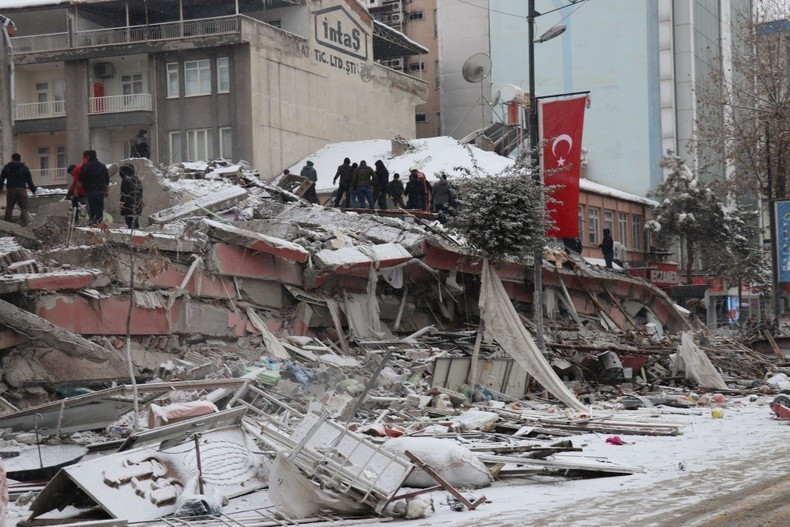The search, rescue and recovery following the earthquake were determined to be very difficult, requiring assistance and solidarity from the international community, when over 11,000 deaths and thousands of injuries were recorded, and the number may further increase with uncountable damage.
The earthquake, which is considered the strongest in Turkey and Syria over the past century, killed thousands of people and left many others homeless, causing heavy damage related to infrastructure, especially destroying several works with great historical and cultural values. Many uncertain buildings in quake-affected areas are at risk of collapsing in the coming days. The extensively-damaged infrastructure has been hindering the relief efforts.
Difficulties in rescue work
According to UN officials, the first international disaster assessment and coordination teams arrived at Adana airport in Turkey. However, limited access roads and a lack of transport trucks in Gaziantep, the epicentre of the first quake, made it difficult to access the site, forcing Turkish disaster agencies to consider mobilizing helicopters and trucks from further provinces. Turkish President Tayyip Erdogan has declared a state of emergency in 10 provinces. The search and rescue operations are facing many difficulties due to bad weather conditions. Especially in Syria, the lack of rescue equipment, due to the impact of sanctions on this Middle Eastern country, has also prolonged search and rescue efforts.
With a sense of urgency, the search and rescue forces rescued about 8,000 people. The UN High Commissioner for Refugees (UNHCR) provided those affected by the earthquake disaster with kitchens, mattresses and tents.
According to UNHCR, more than 1.7 million, among 15 million people living in the 10 worst-affected provinces in Turkey, are Syrian refugees. Turkey has been a host for refugees in the world since 2014. About 4 million refugees and asylum seekers are currently in Turkey, under temporary international protection.
Meanwhile, the UN Educational, Scientific and Cultural Organisation (UNESCO) expressed concern about the damage to the heritage sites in Syria and Turkey and pledged to support the countries affected by the devastating earthquake. In Syria, UNESCO is particularly concerned about the situation in the ancient city of Aleppo, which is on the World’s Heritage List and is in danger.
UNESCO said significant damage has been recorded in this ancient city, as the western tower of the old city has collapsed and several buildings in the souks have been weakened. Meanwhile, several buildings in Diyarbakir city of Turkey have collapsed. It is home to the Diyarbakir Fortress and the adjacent Hevsel Gardens, which were listed among the World Heritage sites.
The solidarity and sharing
Rescuers are racing against time in harsh winter conditions to save survivors from the rubble of collapsed buildings. In addition to the financial support commitments, so far, the UN, the European Union (EU), NATO and about 20 countries have committed or sent forces to participate in rescue work in Turkey and Syria. The UN announced a 25 million USD grant for humanitarian work in affected areas of the two countries and said that it had sent groups to assess the actual situation and provide assistance when necessary.
NATO showed solidarity with its member Turkey, by deploying a force of 1,400 people across 20 allies and partner countries, to carry out rescue work in Turkey. NATO is also flying its flag at half-mast in commemoration of the earthquake victims. Finland said it would provide 1 million EUR in humanitarian aid to the victims of both Turkey and Syria, through the International Federation of Red Cross and Red Crescent Societies (IFRC), while Sweden will also provide 37 million Swedish Krona (3.5 million USD) for these two countries. Russia and the UK have sent search and rescue teams to Turkey and Syria, while Germany and Ukraine have expressed their willingness to provide necessary assistance.
Gulf countries have also urgently taken measures to support rescue work in Turkey and Syria. The United Arab Emirates (UAE) announced an aid of 100 million USD, which was divided equally between the two countries. Saudi Arabia established an aviation bridge to provide medical services, accommodation, food and logistical support, to reduce the impact of the earthquake on people in Syria and Turkey. Jordan and Lebanon have dispatched rescue and humanitarian aid teams, while Egypt has deployed five military planes carrying medical supplies to both earthquake-stricken countries. Qatar has also sent 120 rescue workers to Turkey, along with a field hospital, relief aid, tents and winter supplies.
US President Joe Biden said that two search and rescue teams (consisting of 158 people in total) have been deployed in Turkey, while the Pentagon and the US Agency for International Development (USAID), are coordinating with Turkish partners on related work. China also provided emergency aid of 5.9 million USD to Turkey and sent rescue teams to the countries. China will also carry out urgent disaster relief operations for Syria, said the China International Development Cooperation Agency. Countries such as Japan, Norway, Spain, Canada, Mexico, Algeria, and Tunisia have also sent rescue groups to support earthquake-affected areas in Turkey and Syria.
According to experts, the number of thousands of deaths due to the earthquake in both Turkey and Syria has exceeded the rescue capacity of any single country. Therefore, many countries have accelerated assistance for these two nations. Rescuers are racing against time to find survivors and need to mobilise all resources as well as the international community to help Turkey and Syria overcome the aftermath of this terrible earthquake.
















